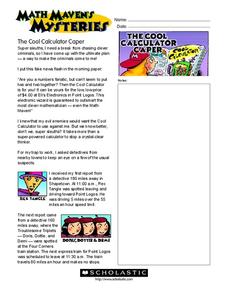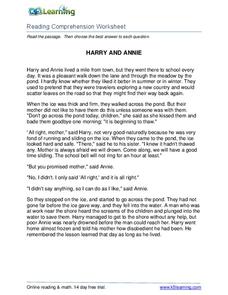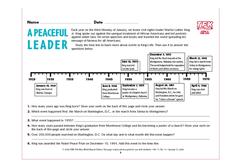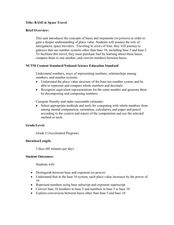EngageNY
End-of-Module Assessment Task: Grade 8 Module 4
Connect proportional linear equations and systems. The seven-question assessment is the last installment in a 33-part series. The items cover comparing proportional relationships, slope concepts, and simultaneous linear equations. To...
K5 Learning
Space Based Astronomy
How much astronomy can you study with the naked eye? Learn more about the ways scientists explore the galaxy with a short reading passage and set of short-answer questions.
Teach Engineering
The Amazing Red Planet
Introduce your class to Mars with a resource that provides information about its size, location, length of day, length of year, number of moons, and average temperature. Also includes is information about the lans for past and future...
Radford University
Fuel Efficient Function Activity
Pupils research the five most fuel efficient vehicles of the same type and come up with a way to display the mile per gallon for each vehicle. After choosing a vehicle, scholars create graphs to display miles traveled given the amount of...
Curated OER
Math Maven's Mysteries
In these math word problem worksheets, learners help solve the mystery about 'The Cool Calculator Caper.' Students use the formula to find what time the evil wrongdoer will arrive in Point Logos.
Curated OER
Math Maven's Mysteries: Race Against Captain Devious
In these math word problem worksheets, students help solve the mystery about the 'Race Against Captain Devious.' Students must solve the distance travel word problem using kilometers and rounding their answers to the nearest whole number.
Curated OER
Traveling aroud Our Town
Students are asked to describe to a partner how he or she walks to school or the bus stop. They are shown on the overhead an one-inch grid paper, and at the intersection of two lines on the grid paper, students are shown a house and...
Curated OER
Volcanoes are a Blast-Working with Simple Equations
For this projectile motion worksheet, high schoolers solve 3 problems and an inquiry problem using three equations that describe projectile motion. One equation is for the maximum velocity to reach a height, H, the other is the maximum...
Curated OER
Mush! Tracking Travelers on the Trail
Students get to know Alaska and the Iditarod route that is run by dogs as they track the mushers' progress on a map that they create specifically for the race. They learn about latitude, longitude, plotting on a map, checkpoints, and...
Curated OER
"Space" Exploration
Fourth graders identify the attribute of volume of an object. Units of measurement are reviewed and utilized in this instructional activity.
Curated OER
Earthquakes: Third Grade Lesson Plans and Activities
Introduce third graders to energy waves with a hands-on geology activity, in which they answer questions and compare seismograms in the San Francisco Bay area. After a demonstration that shows how bigger waves indicate a high-intensity...
02 x 02 Worksheets
Inverse Variation
Discover an inverse variation pattern. A simple lesson plan design allows learners to explore a nonlinear pattern. Scholars analyze a distance, speed, and time relationship through tables and graphs. Eventually, they write an equation to...
Curated OER
Single Event Upsets in Aircraft Avionics
In this aircraft avionics worksheet, science fans read about the first unmanned air vehicle that collects data about the Earth and is subject to damage by cosmic ray showers. Pupils analyze two graphs of data showing the neutron flux vs....
Curated OER
Get the Picture!
Astronomers practice downloading data from a high-energy satellite and translate the data into colored or shaded pixels. As a hands-on activity, they use pennies to simulate high-energy satellite data and they convert their penny...
K5 Learning
Harry and Annie
Henry and Annie are on thin ice—literally! Read about the siblings' winter walk and the importance of staying safe with a short passage and four follow-up questions.
Learnbat
ShowMe Interactive Whiteboard
A presentation tool to record written text and pictures with audio voice-over and share privately or publicly online.
Curated OER
Earthquakes: Kindergarten Lesson Plans and Activities
Beginning with a pre-lab, kindergarteners trace the letters in the word earthquake and discuss what happens in an earthquake. The lab portion allows young scientists realize that earthquakes trigger shaking of different intensities...
Time For Kids
A Peaceful Leader
The legacy of Dr. Martin Luther King, Jr's life and message is just as important today as it was in his lifetime. Introduce elementary learners to the movement for civil rights with a timeline of Dr. King's life, as well as comprehension...
Teach Engineering
Ramp and Review (for High School)
Rolling for momentum. As part of a study of mechanical energy, momentum, and friction, class members experiment rolling a ball down an incline and having it collide with a cup. Groups take multiple measurements and perform several...
Curated OER
BASE-ic Space Travel
In this 3-day place-value lesson, upper-elementary kids investigate the base 5 and base 2 systems as an introduction to exponents and powers. They create a pocket chart to help ground their understanding of bases, exponents, and powers,...
Curated OER
Westward Expansion
Students locate California and New York on a map and explore available means of travel in the 19th century. Students explore the role of trade in pioneer America and simulate various barter transactions.
Illustrative Mathematics
Robot Races
Analyze data on a graph to answer three questions after a robot race. Learners practice comparing ratios and reading points on a graph. Answers may vary on the last question based on accuracy of graphing. Use the lesson along with three...
Curated OER
Passport to the Eastern Hemisphere
Seventh graders explore the Eastern Hemisphere. They investigate the customs, currency, climate, location and other facts needed in order to travel to a specific country. Students receive a stamp on their "passport" when their research...
Illustrative Mathematics
Downhill
A car traveling down a steep hill is the model for this resource. The confusion comes when the elevation, E, is given in terms of distance, d. The distance, d, is the horizontal distance from E. Therefore, the equation, E = 7500 – 250d,...

























